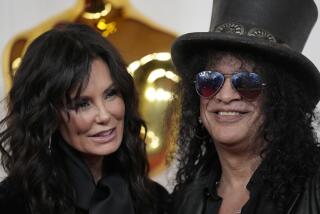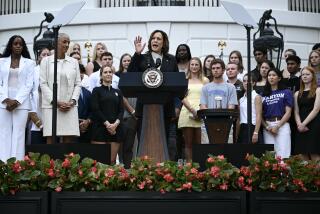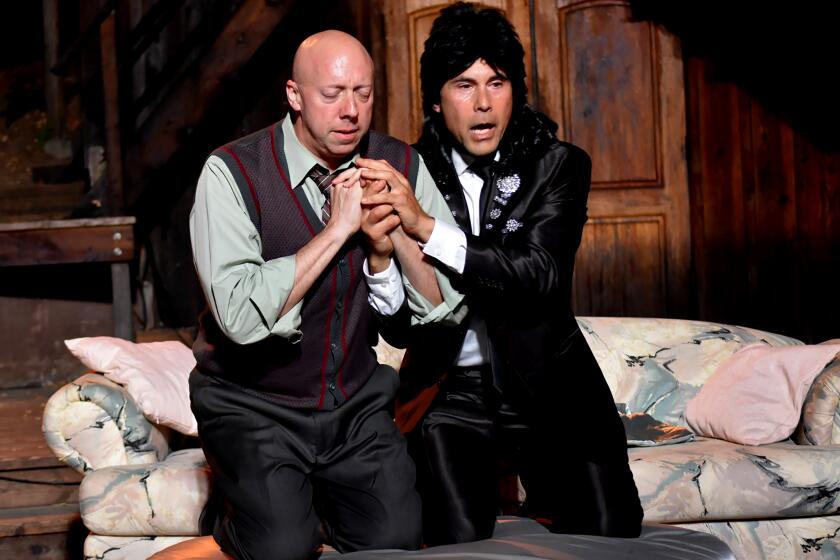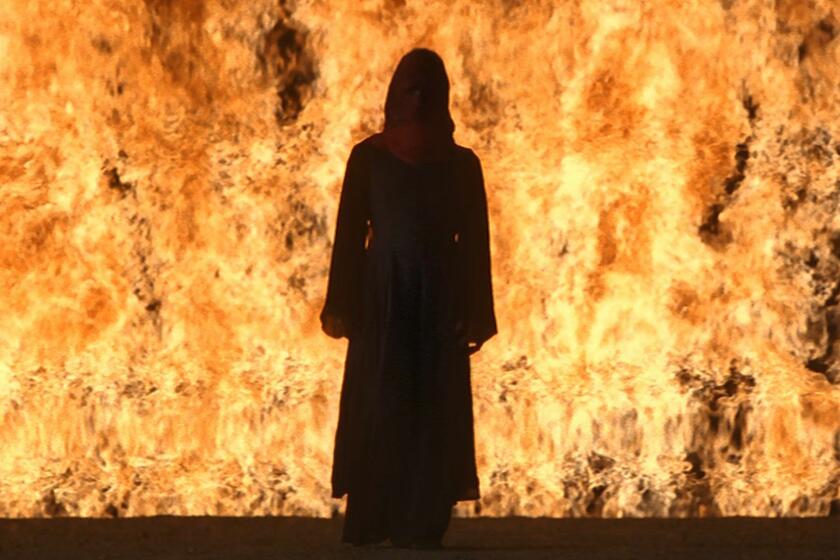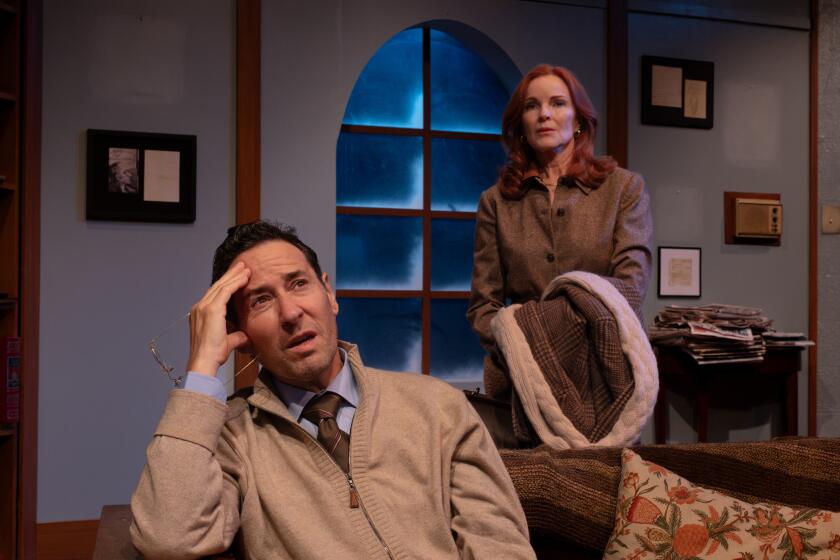Repast is prologue
A short, somewhat nebbishy writer in an overcoat trudges through the cold gray streets of Manhattan, en route to a restaurant meal with Andre Gregory. This is the opening of Gregory and Wallace Shawn’s 1981 cult-classic film, “My Dinner With Andre,” directed by Louis Malle. Nearly 25 years later, the scene reprises itself -- only this time it’s me, on my way to play the Wally Shawn role with the titular Andre, longtime icon of American experimental theater.
The reason for My Lunch With Andre is his upcoming residency at REDCAT, Tuesday through Saturday, which will include screenings of “My Dinner With Andre” and “Vanya on 42nd Street” as well as four performances of Gregory’s solo work “After Dinner.” For our conversation, he’s chosen Sant Ambroeus, a bistro in his Greenwich Village neighborhood, where I discover him ensconced in a corner booth, studying a newspaper article about a recent painting exhibition.
Waiting for the photographer, he’s quick to muse about coming back to Los Angeles. “I’m actually thrilled about doing something theatrical in L.A., because of course I’ve made movies in L.A., but making a movie in L.A. is like making a movie anywhere,” he says. “And I did get kicked out of L.A. once,” he continues, with a Cheshire cat smile, referring to his brief but controversial reign at the helm of the Inner City Cultural Center, in the wake of the Watts riots.
As Gregory gets rolling, I interject a word or two -- not unlike the occasional “Uh-huh” or “Gosh” with which the more introverted Shawn punctuates the voluble Gregory’s arias in the early part of “Dinner.” And yet Gregory is different from the motor-mouthed version of himself he played on-screen. Wearing a royal-blue sweater that brings out twinkly eyes, he speaks softly and slowly, giving the impression of gentleness and a passionate inquisitiveness undimmed by life’s vagaries.
Although his films with Shawn and Malle brought him to a wider public, Gregory first made his mark as a stage director, most notably with his company the Manhattan Project, where he created acclaimed productions of “Endgame,” “The Seagull” and “Alice in Wonderland,” which ran for seven years, toured internationally and was photographed by Richard Avedon.
And yet unlike many artists of the avant-garde, Gregory’s aesthetic isn’t tied to a particular visual style but focuses on the most elemental ingredients of drama. “Something Louis Malle and I had in common was that every time he did a new work, it seemed to have no relationship to the work he’d just done,” Gregory says. “So often people misunderstood his work, and often people have misunderstood my work. I don’t even think of myself as part of any movement or an experimental theater director, although I’ve been experimenting my whole life.”
Of course, with the possible exception of the 1970s, working in experimental theater in the U.S. hasn’t ever been easy. But Gregory, 70, is philosophical about his chosen path. “The art of winning at poker is to win with a bad hand,” he says. “So if you’re not given much to work with, sometimes it leads -- well, with me it’s led to minimalist, very simple kind of work that doesn’t rely on sets, costumes and lights and is focused really on the depth and ambiguity of the human being.”
Love and loss
“After Dinner,” the performance Gregory will present at REDCAT, includes a reading of his play “Bone Songs” combined with what he describes as “stories about my past and digressions about the world in which we live.” The play is a series of love poems dealing with Gregory’s first marriage and the loss of his wife of 33 years.
He began “Bone Songs” in the early ‘80s but did not return to the piece until after his wife, Chiquita, died in 1991. “I wanted to allow her to say to me the things she’d never had a chance to say because she died young,” he says. “Also, you know the Tibetans feel that as long as we hold on to a dear one who’s died, they can’t continue their journey. So the motivation of the play was also to allow her to move on and to allow me to move on.”
To those who know Gregory as an activist, either from the Vietnam days or his current involvement with antiwar groups, his play’s themes of love and loss may come as a surprise. But he insists it’s not a new concern: “Having the courage to take the risk of loving in spite of all the evidence that you could get harmed, I think it’s been an ongoing theme in my work.”
That probably had something to do with growing up with a father and mother he likens to Macbeth and Lady Macbeth. Those parents, Jewish emigres from Europe, left Berlin the day Hitler came to power and eventually sailed to the U.S. on one of the last passenger ships to cross the Atlantic before the war. Gregory’s businessman father had known Marlene Dietrich and others back in pre-Hitler Berlin. “So when they went to Hollywood, Dietrich started introducing them into the movie colony,” Gregory recalls. “Our house used to be filled with amazing people: Charles Boyer, Abbott and Costello, Burns & Allen, Basil Rathbone, Walter Pidgeon, Lana Turner, Garbo. My mother had an affair with Errol Flynn and Bugsy Siegel....”
“Both?” I ask, mindful of my duties as the Wally surrogate.
“Not at the same time,” he says, without missing a beat. “I know that atmosphere I grew up in was probably what started my interest in theater and film.”
Gregory went on to graduate from Harvard and the Neighborhood Playhouse before founding the Seattle Repertory Theatre and the Philadelphia Theatre of the Living Arts. He returned to L.A. as artistic director of the Inner City Cultural Center.
“I didn’t want to take the L.A. job because I’d just been kicked out of Philadelphia, which was my first theater. I was taken out of my theater in a paddy wagon. I was young and angry. I did a play that featured Afro American Black Panther Watusis wearing nothing but penis sheaths with rosaries. You know, it was the ‘60s.”
But come to L.A. he did and soon found himself in hot water again with a production of Moliere’s “Tartuffe.” “Lou Gossett played an African American Uncle Tom who’s in love with a white woman. It was set in Mexican American California of the 1840s, and the husband was portrayed as a closet-queen Lyndon Johnson cattle rancher. It managed to offend just about everybody: the black community, the white community. The kids loved it, and Eldridge Cleaver loved it, but it did create quite a scandal.”
In the late ‘60s, Gregory launched the Manhattan Project, which would continue for 12 years. Despite the group’s success, Gregory abruptly left directing in the mid-’70s. And it is the telling of tales from that six-year hiatus that’s at the heart of “My Dinner With Andre,” in which the director recounts his adventures in a Polish forest, the Saharan desert, India and Montauk, Long Island. In the film, Shawn and Gregory attempt to connect to each other despite very different approaches to life. The events Gregory relates are, in fact, true, but Shawn shaped the dialogue, and both men are, of course, playing characters -- based on themselves, yes, but still characters.
Nobody expected it to be such a hit, least of all its creators. “This was really done because we thought it was a funny, interesting idea,” he says. “But we knew nobody would go see it.”
The 1994 release “Vanya on 42nd Street,” also directed by Malle and starring Shawn, documented a workshop of Chekhov’s “Uncle Vanya” that was never meant to have an audience. “We were just going to do it for the love of doing it, just rehearse, which we did on and off for four years,” Gregory says. Eventually they did six weeks of run-throughs, for 30 friends each time. “It was just one of those odd miracles that Louis Malle filmed it.”
A daunting tirelessness
My favorite part of “My Dinner With Andre” comes toward the end, when Shawn’s comparatively earthbound character chafes at Andre’s endless recitation of exotic quests and otherworldly concerns. “Well, Andre, you know, if you want to know my actual response to all this -- do you want to know my actual response? ... Andre, really -- I’m just trying to survive -- you know?”
And so it is, after a couple of hours with the off-screen Andre, that I have to hold back a similarly Shawnian response. What’s daunting isn’t Gregory’s tales but his tirelessness, the way he seems undeterred by the quotidian.
He and Shawn have been friends since the days of the Manhattan Project and continue their projects together. They’re collaborating on Shawn’s adaptation of Ibsen’s “The Master Builder,” which they’ve been rehearsing for seven years and hope to film. Gregory is also working on Beckett’s “Endgame,” a project he began right after Sept. 11 and that was originally slated to be part of his REDCAT residency until being postponed.
He feels no need to conform to today’s theater, in which a play rarely gets more than four weeks of rehearsal. “I think the fact that I’ve been so out of any considerations of commercialism makes me a very odd bird to the professional theater -- that and the fact that I rehearse for years,” says Gregory, grinning at his own understatement. “I have no interest in the finished product; it’s the process that fascinates me.”
Such is the idealism that seemed to drive his “Dinner” character, and so too this Andre. “The room now to do serious, passionate, ambiguous, paradoxical, in-depth work has just become so difficult because of the finances,” he says. “But I think if you work from your heart, you find your voice. And if you find your voice, somebody will listen to it.
“You know, ‘Bone Songs’ in a certain way isn’t a play. Only somebody who doesn’t know how to write a play would write that play.
Just as only two people who had no idea how to make a movie would have done ‘My Dinner With Andre.’ ”
*
‘Andre Gregory: After Dinner’
Where: REDCAT, 631 W. 2nd St., Los Angeles
When: 8:30 p.m. Wednesday through Saturday
Ends: Saturday
Price: $24 to $36
Contact: (213) 237-2800
More to Read
The biggest entertainment stories
Get our big stories about Hollywood, film, television, music, arts, culture and more right in your inbox as soon as they publish.
You may occasionally receive promotional content from the Los Angeles Times.
